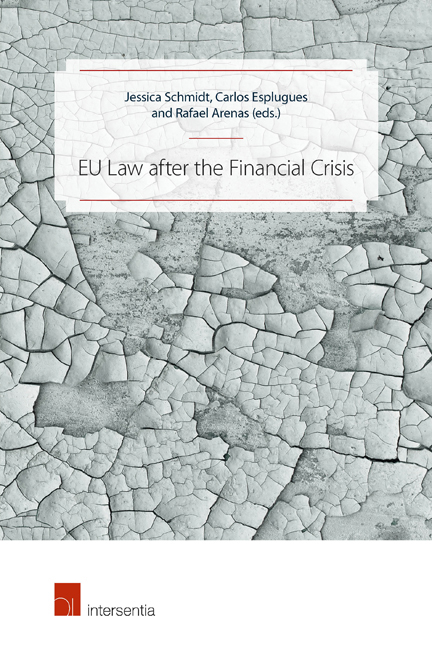Book contents
- Frontmatter
- Contents
- List of Abbreviations
- List of Authors
- Introduction
- PART I RESCUE MECHANISMS AND MONETARY POLICY
- PART II THE IMPACT OF THE FINANCIAL CRISIS ON THE BANKING SECTOR AND CAPITAL MARKETS
- PART III THE FINANCIAL CRISIS AND TAX LAW
- PART IV THE FINANCIAL CRISIS, CONSUMERS AND CONSUMER LAW
- PART V THE FINANCIAL CRISIS AND COMPETITION LAW
- PART VI THE FINANCIAL CRISIS, RESTRUCTURING AND INSOLVENCY LAW
- PART VII THE SOCIAL DIMENSION OF THE FINANCIAL CRISIS AND EU CITIZENSHIP
- Reflections on the Social and Human Dimension of the Economic and Financial Crisis in the European Union
- New Developments on the Free Movement of Persons in the European Union in a Time of Crisis. Eroding the European Citizenship?
- PART VIII REFLECTIONS ON THE IMPACT OF THE FINANCIAL CRISIS ON THE GENERAL EUROPEAN LEGAL FRAMEWORK AND THE FUNDAMENTAL “EUROPEAN IDEA”
Reflections on the Social and Human Dimension of the Economic and Financial Crisis in the European Union
from PART VII - THE SOCIAL DIMENSION OF THE FINANCIAL CRISIS AND EU CITIZENSHIP
Published online by Cambridge University Press: 13 December 2017
- Frontmatter
- Contents
- List of Abbreviations
- List of Authors
- Introduction
- PART I RESCUE MECHANISMS AND MONETARY POLICY
- PART II THE IMPACT OF THE FINANCIAL CRISIS ON THE BANKING SECTOR AND CAPITAL MARKETS
- PART III THE FINANCIAL CRISIS AND TAX LAW
- PART IV THE FINANCIAL CRISIS, CONSUMERS AND CONSUMER LAW
- PART V THE FINANCIAL CRISIS AND COMPETITION LAW
- PART VI THE FINANCIAL CRISIS, RESTRUCTURING AND INSOLVENCY LAW
- PART VII THE SOCIAL DIMENSION OF THE FINANCIAL CRISIS AND EU CITIZENSHIP
- Reflections on the Social and Human Dimension of the Economic and Financial Crisis in the European Union
- New Developments on the Free Movement of Persons in the European Union in a Time of Crisis. Eroding the European Citizenship?
- PART VIII REFLECTIONS ON THE IMPACT OF THE FINANCIAL CRISIS ON THE GENERAL EUROPEAN LEGAL FRAMEWORK AND THE FUNDAMENTAL “EUROPEAN IDEA”
Summary
INTRODUCTION
The economic and financial crisis has sparked a genuine “existential crisis” for the European Union, as a political, economic and social project, primarily because those most affected by the crisis have been the people. Hence the interest in reflecting on the social impact and human dimension of the crisis in some of the policies and fields of European Union law that are most directly related to individuals, with the aim of identifying new legal issues that the crisis has brought to the surface. In particular, these reflections will focus on the links that emerge between the measures adopted by the European Union and the Member States in order to implement the rescue plans and the protection of fundamental social rights, on the one hand, and citizenship of the Union and immigration, on the other.
The reason for these links lies in the well-known fact that the crisis has made Europeans poorer, especially nationals of Member States affected by the bailout measures who have suffered a curtailment of their social rights as a result of declining employment conditions (due to salary cuts, the new circumstances of casual/temporary work or job losses) and reduced access to social benefits and public services (health, social security, education, etc.). Simultaneously, the exercise of free movement towards Member States with greater employment opportunities and stronger social welfare support has increased significantly, as has migration towards third countries, in fact. Furthermore, the anti- European discourse of some Member State governments has intensified, with the free movement of Union citizens and the alleged burden that this places on social security systems due to the abuse or fraudulent use of the rights of free movement and residence as the main bones of contention.
This scenario illustrates the current state of the European Union which, as a joint project, is faced with the inhibitory capacity of state nationalism and the possessive individualism of its citizens. For these reasons, it seems essential to assert the values of egalitarianism, solidarity and human rights as elements which lay the foundations for a process of integration, the continued existence and raison d'etre of which depend on the support of its citizens.
- Type
- Chapter
- Information
- EU Law after the Financial Crisis , pp. 255 - 262Publisher: IntersentiaPrint publication year: 2016



